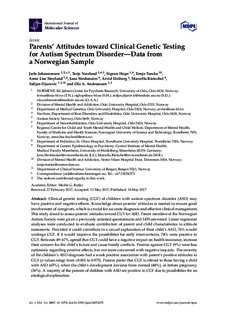| dc.contributor.author | Johannessen, Tor Jarle | |
| dc.contributor.author | Nærland, Terje | |
| dc.contributor.author | Hope, Sigrun | |
| dc.contributor.author | Torske, Tonje | |
| dc.contributor.author | Høyland, Anne Lise | |
| dc.contributor.author | Strohmaier, Jana | |
| dc.contributor.author | Heiberg, Arvid | |
| dc.contributor.author | Rietschel, Marcella | |
| dc.contributor.author | Djurovic, Srdjan | |
| dc.contributor.author | Andreassen, Ole Andreas | |
| dc.date.accessioned | 2018-06-06T11:16:26Z | |
| dc.date.available | 2018-06-06T11:16:26Z | |
| dc.date.created | 2017-06-13T12:09:51Z | |
| dc.date.issued | 2017 | |
| dc.identifier.citation | International Journal of Molecular Sciences. 2017, 18 (5), 1-14. | nb_NO |
| dc.identifier.issn | 1422-0067 | |
| dc.identifier.uri | http://hdl.handle.net/11250/2500571 | |
| dc.description.abstract | Clinical genetic testing (CGT) of children with autism spectrum disorder (ASD) may have positive and negative effects. Knowledge about parents’ attitudes is needed to ensure good involvement of caregivers, which is crucial for accurate diagnosis and effective clinical management. This study aimed to assess parents’ attitudes toward CGT for ASD. Parent members of the Norwegian Autism Society were given a previously untested questionnaire and 1455 answered. Linear regression analyses were conducted to evaluate contribution of parent and child characteristics to attitude statements. Provided it could contribute to a casual explanation of their child’s ASD, 76% would undergo CGT. If it would improve the possibilities for early interventions, 74% were positive to CGT. Between 49–67% agreed that CGT could have a negative impact on health insurance, increase their concern for the child’s future and cause family conflicts. Parents against CGT (9%) were less optimistic regarding positive effects, but not more concerned with negative impacts. The severity of the children’s ASD diagnosis had a weak positive association with parent’s positive attitudes to CGT (p-values range from <0.001 to 0.975). Parents prefer that CGT is offered to those having a child with ASD (65%), when the child’s development deviates from normal (48%), or before pregnancy (36%). A majority of the parents of children with ASD are positive to CGT due to possibilities for an etiological explanation. | nb_NO |
| dc.language.iso | eng | nb_NO |
| dc.publisher | MDPI AG | nb_NO |
| dc.rights | Navngivelse 4.0 Internasjonal | * |
| dc.rights.uri | http://creativecommons.org/licenses/by/4.0/deed.no | * |
| dc.title | Parents’ Attitudes toward Clinical Genetic Testing for Autism Spectrum Disorder—Data from a Norwegian Sample | nb_NO |
| dc.type | Journal article | nb_NO |
| dc.type | Peer reviewed | nb_NO |
| dc.description.version | publishedVersion | nb_NO |
| dc.source.pagenumber | 1-14 | nb_NO |
| dc.source.volume | 18 | nb_NO |
| dc.source.journal | International Journal of Molecular Sciences | nb_NO |
| dc.source.issue | 5 | nb_NO |
| dc.identifier.doi | 10.3390/ijms18051078 | |
| dc.identifier.cristin | 1475650 | |
| dc.description.localcode | © 2017 by the authors. Licensee MDPI, Basel, Switzerland. This article is an open access article distributed under the terms and conditions of the Creative Commons Attribution (CC BY) license ( http://creativecommons.org/licenses/by/4.0/). | nb_NO |
| cristin.unitcode | 194,65,35,5 | |
| cristin.unitname | RKBU Midt-Norge - Regionalt kunnskapssenter for barn og unge - psykisk helse og barnevern | |
| cristin.ispublished | true | |
| cristin.fulltext | original | |
| cristin.qualitycode | 1 | |

